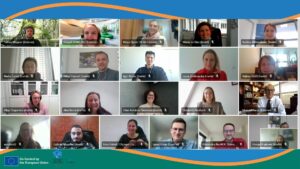OCEAN Project's last Peer-to-peer Roundtable

On 18 March, the OCEAN Consortium convened for its final Peer-to-peer Roundtable. Climate Action Officers from 18 National Olympic Committees (NOCs) presented their progress in finalising carbon footprint reduction strategies, scheduled for completion in April 2025. Once again, this collaborative exchange provided a platform for sharing best practices, recommendations, and concrete guidance to further support the refinement of strategies.
Additionally, the Consortium received updates on upcoming deliverables and tools, due to be published on the OCEAN Toolbox platform. Climate Action Officers provided their final feedback to enhance the applicability of the Carbon Footprint Measurement Tool for sport organisations. The tool will be soon freely available on the OCEAN Toolbox platform for all 206 NOCs and sport organisations in English, Spanish and French.
SHARE 2.0 Community of Practice on Green and Sustainable Sport
On March 11, the European Commission’s SHARE 2.0 initiative hosted a capacity-building event to introduce the Manifesto for Environmentally Sustainable European Sport (Manifesto). The event served as a milestone for SHARE 2.0, reinforcing the critical role of sport organisations in contributing to broader climate change and sustainability objectives aligned with the EU Green Deal. A highlight of the event was the presentation of the Manifesto by Mike McClure from the European Network of Outdoor Sports. The Manifesto intends to be a framework for sport organisations, policymakers, and stakeholders to formalise their commitment to sustainability and will soon be available for signing. This public commitment, as was emphasised at the event, in turn, has the potential to strengthen organisational governance and accountability.
At the event, the EOC EU Office showcased the OCEAN Project, demonstrating how its deliverables, particularly the Carbon Footprint Measurement Tool, can advance the climate efforts of sport organisations.
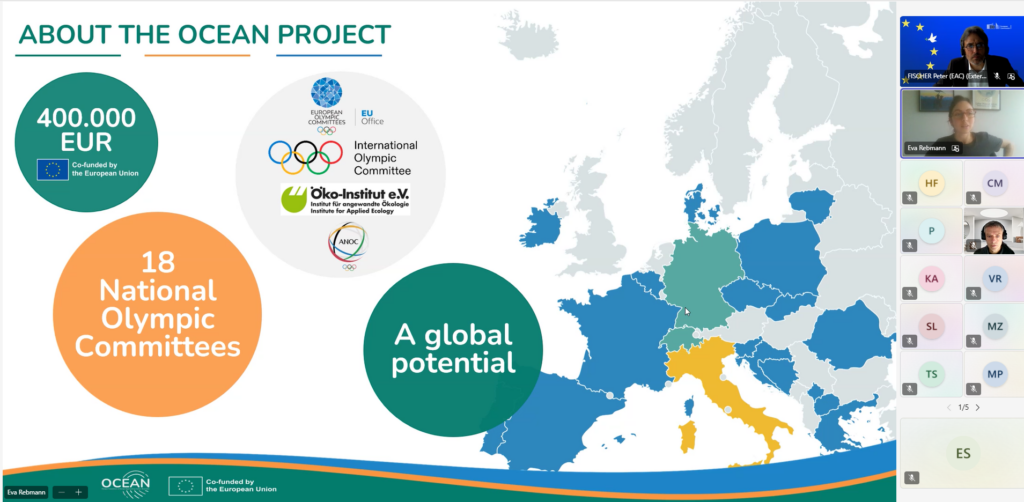
Bulgarian Peer Learning Activity
On 20 March, the OCEAN Project was showcased at the roundtable “Celebrating EU-Funded Success Stories in Sustainable Sport,” organised by the Bulgarian Ministry of Youth and Sports in the framework of their Peer Learning Activity (PLA) on “Pioneering Sustainable Sport: Innovative Solutions for Environmentally Friendly Practices and Events”. Attended by representatives of EU Member States, EU institutions, and sports organisations, the PLA shed light on existing policies and initiatives that promote sustainability in sports.
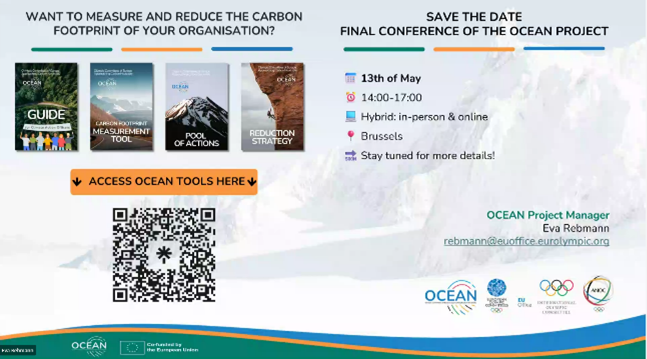
OCEAN Final Conference: SAVE THE DATE!
After two years of dedicated efforts to raise awareness on climate change in sport, reduce 18 NOCs carbon footprint and drive meaningful climate action, the OCEAN Project's Final Conference will take place on 13 May in Brussels and online.
The event will bring together Climate Action Officers, sport organisations, IOC, sustainability experts, EU institutions and other key stakeholders to showcase the project's impact on sport organisations throughout Europe, innovative tools and resources, and collaborative efforts in advancing sustainability in sport.

SAVE THE DATE!
After two years of dedicated efforts to raise awareness on climate change in sport, reduce 18 National Olympic Committees' (NOCs) carbon footprint and drive meaningful climate action, the OCEAN Project's Final Conference is just two months away.
📅 13 May 2025
📍 Brussels, Belgium & Online
This event, marking the official conclusion of the OCEAN Project, will bring together Climate Action Officers, sport organisations, the International Olympic Committe, sustainability experts, EU institutions and other key stakeholders to showcase the project's impact on sport organisations throughout Europe, innovative tools and resources, and collaborative efforts in advancing sustainability in sport.
In the meantime, explore the OCEAN Project Toolbox platform and discover the tools already available to support sport organisation to advance climate action.
Stay tuned for more details on the agenda and speakers, to be announced soon.
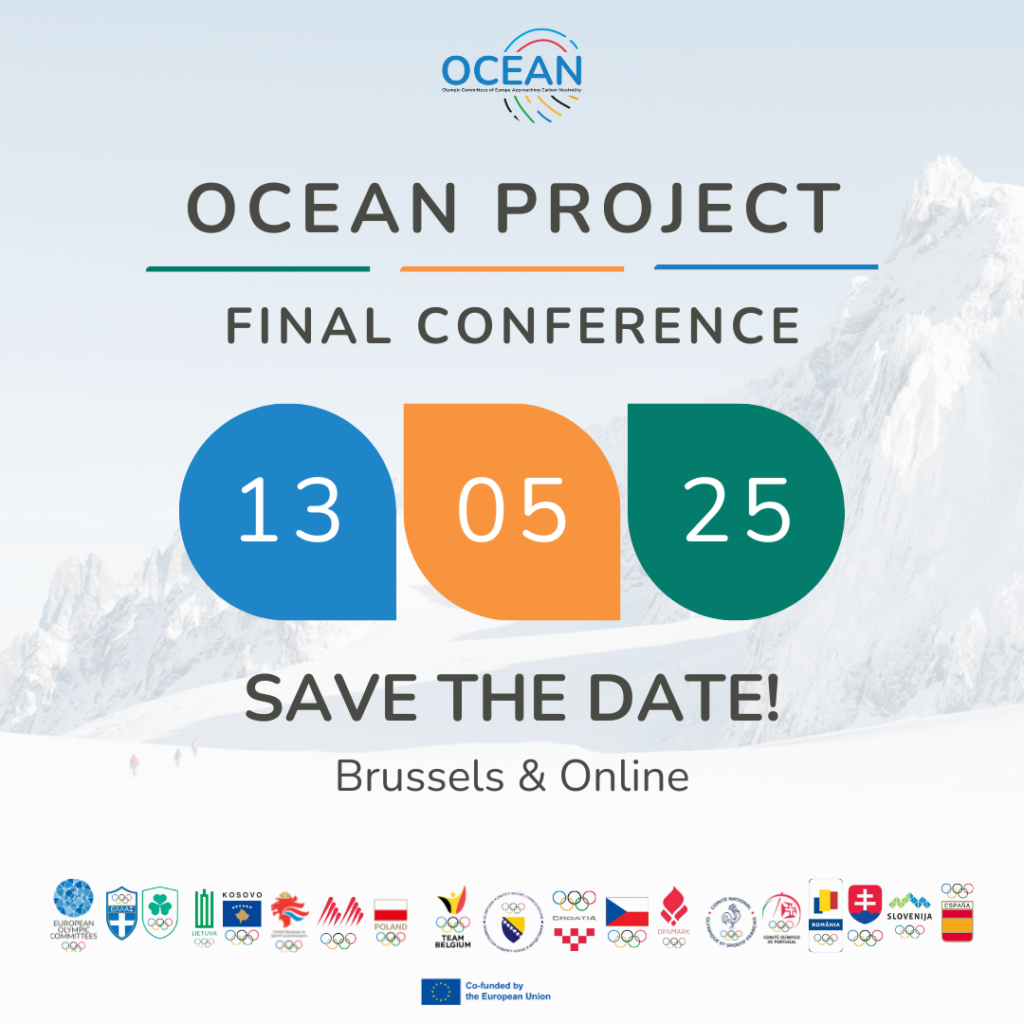
In January, the OCEAN Project celebrated its second anniversary and officially entered its final phase with Climate Action Officers from 18 National Olympic Committees (NOCs) advancing on their path to reduce their carbon footprints as part of a collective effort to tackle climate change.
Analysis of 18 NOCs’ carbon footprint
Throughout the project, the 18 NOCs have completed their carbon footprint measurement for 2022, marking the first step towards mitigating their environmental impact. The Comparative analysis of the NOCs’ footprints, presented by Öko-Institut, highlights primary sources of emissions. Building on these results, the NOCs are now working towards adopting a carbon footprint reduction strategies by April 2025, aligned with the UN Sports for Climate Action Framework (S4CA), supported by the International Olympic Committee.
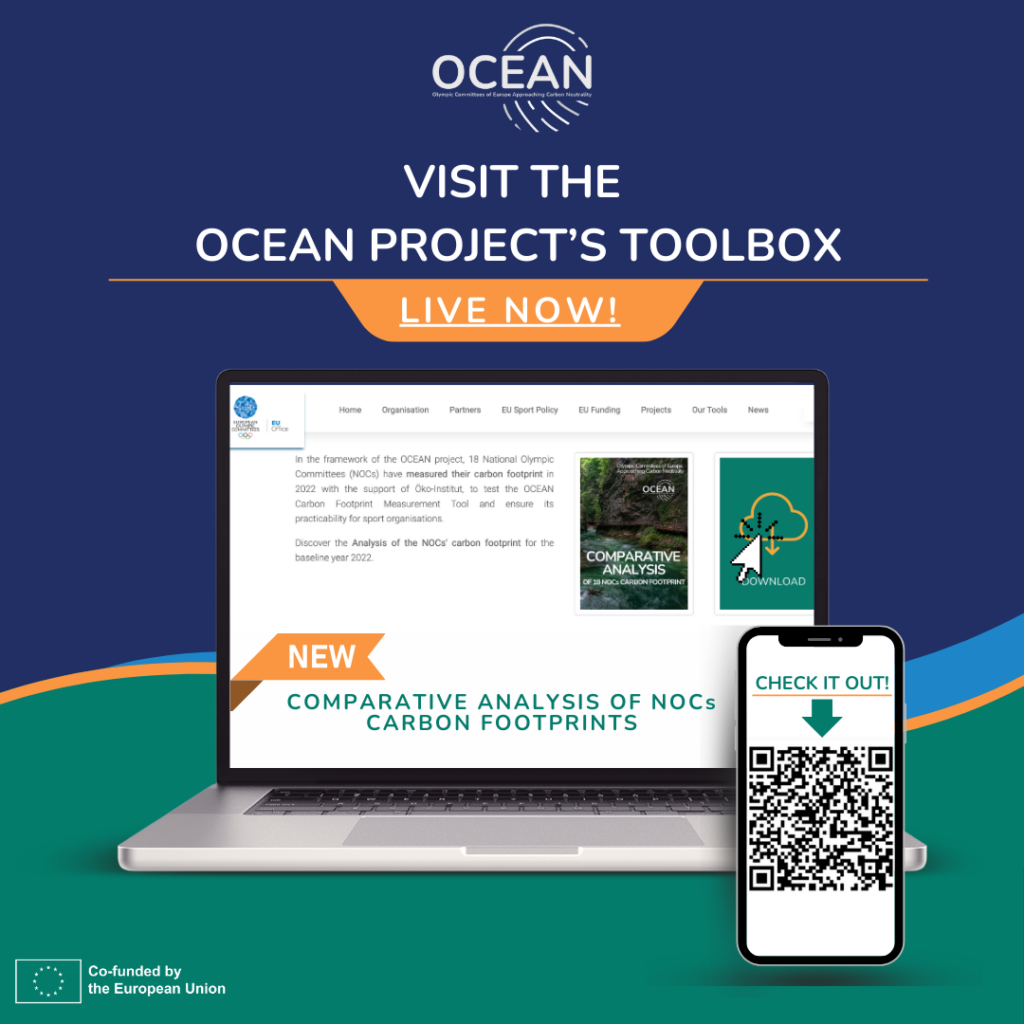
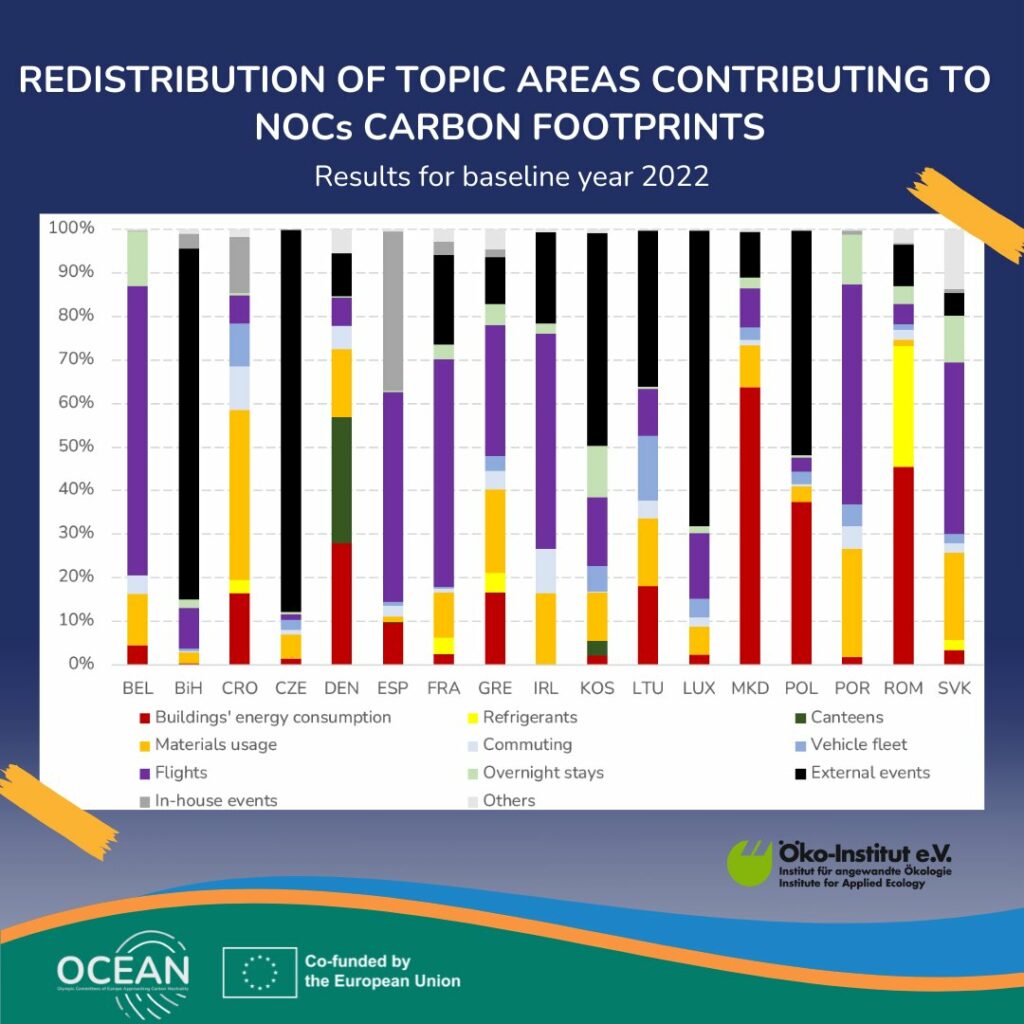
Guide for Climate Action Officers
This comprehensive process has included a structured five-module training course for Climate Action Officers, covering key topics such as the fundamentals of climate change, measures to reduce the impact of transport or procurement, and communication about sustainability. Building on this training, a practical Guide for Climate Action Officers was developed to serve as a step-by-step resource for sport organisations embarking on the carbon footprint reduction process. This guide provides clear, actionable steps tailored to the unique needs of sports entities, enabling them to systematically assess their emissions, identify reduction opportunities, and implement strategies that align with global sustainability goals.
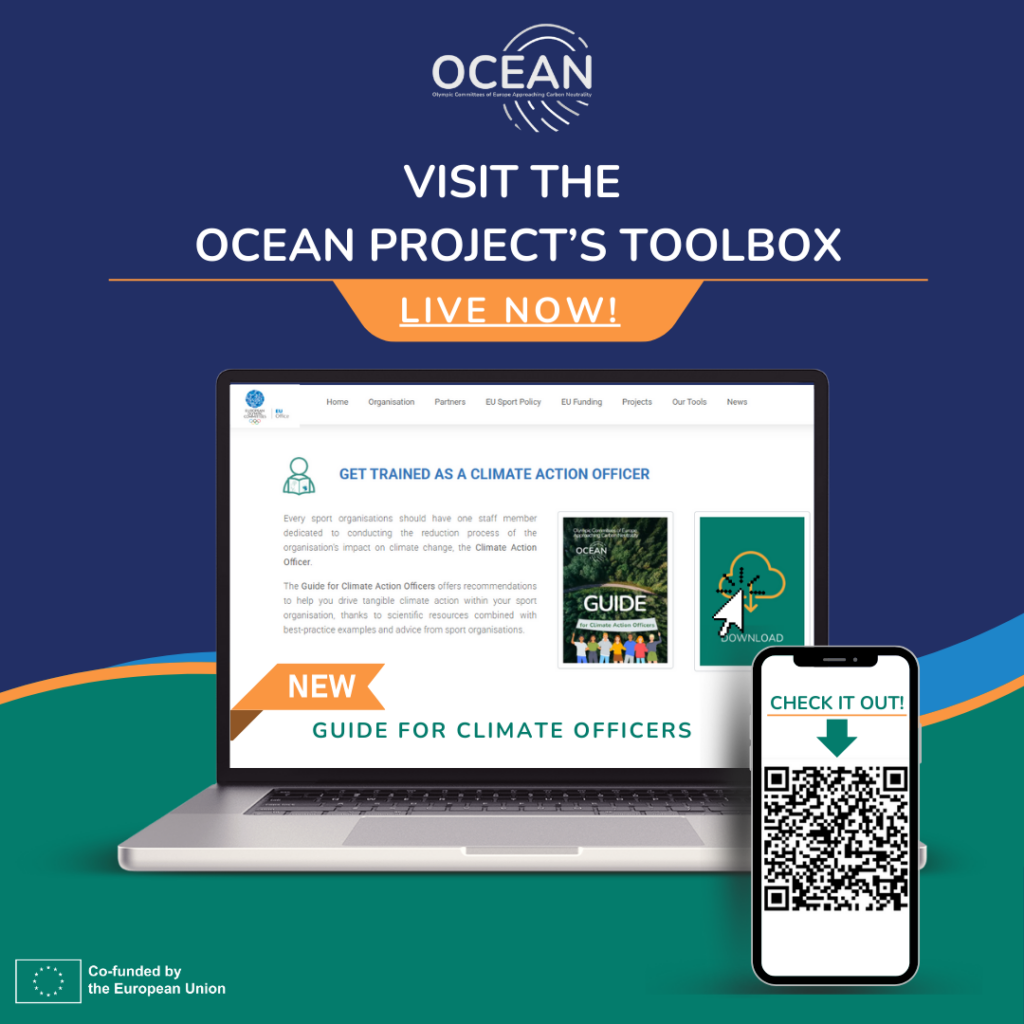
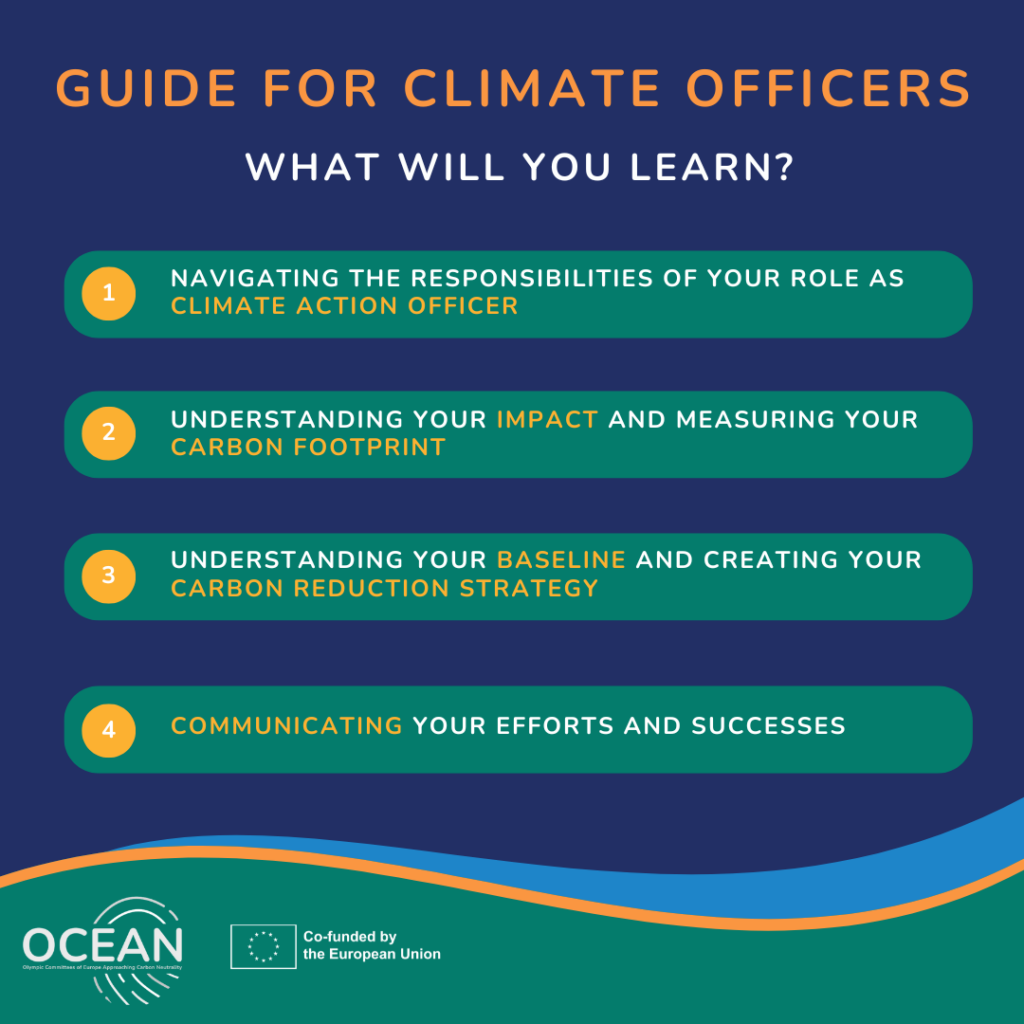
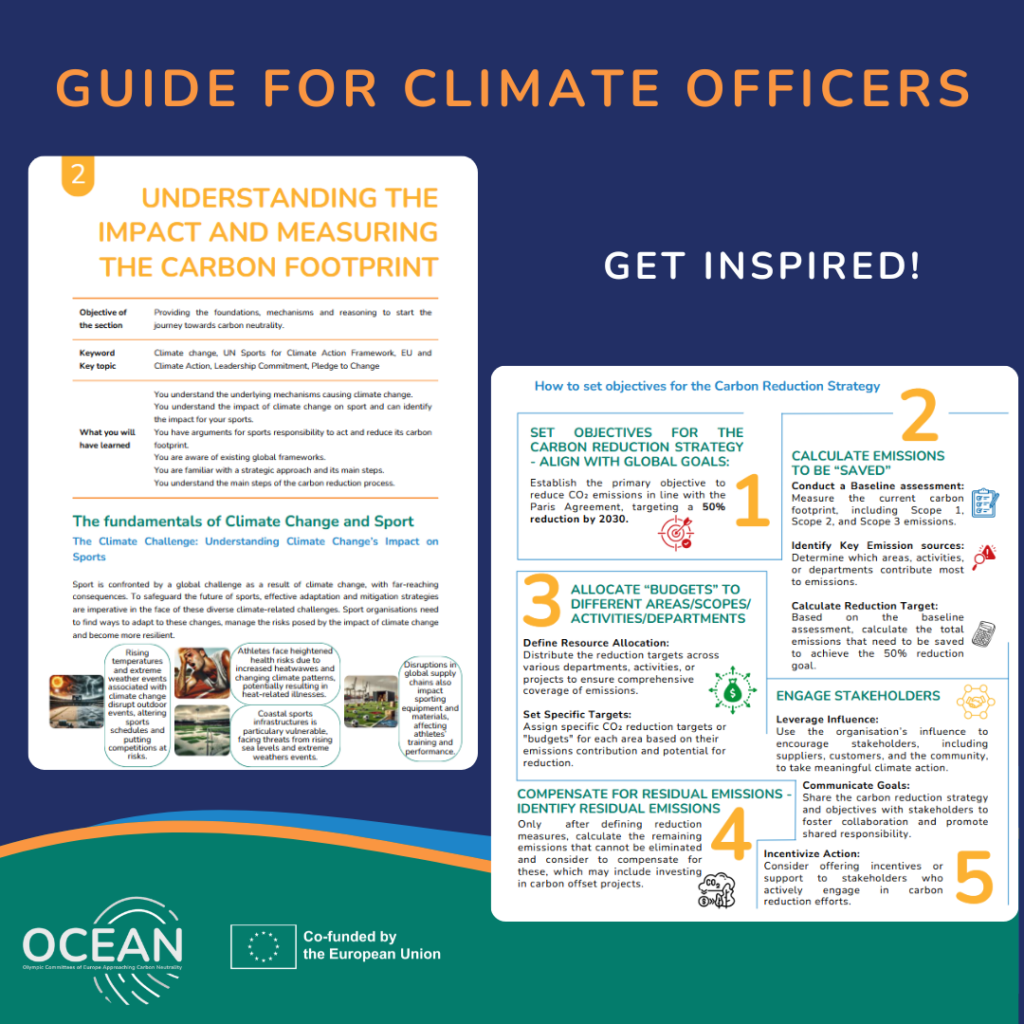
Pool of Actions for carbon footprint reduction
To further support sport organisations in reducing their carbon footprints, the Pool of Actions was developed together with the Öko-Institut. Comprising a collection of over 100 measures and good practices examples to reduce carbon footprint in high-impact areas, such as travel, energy consumption, or event production.
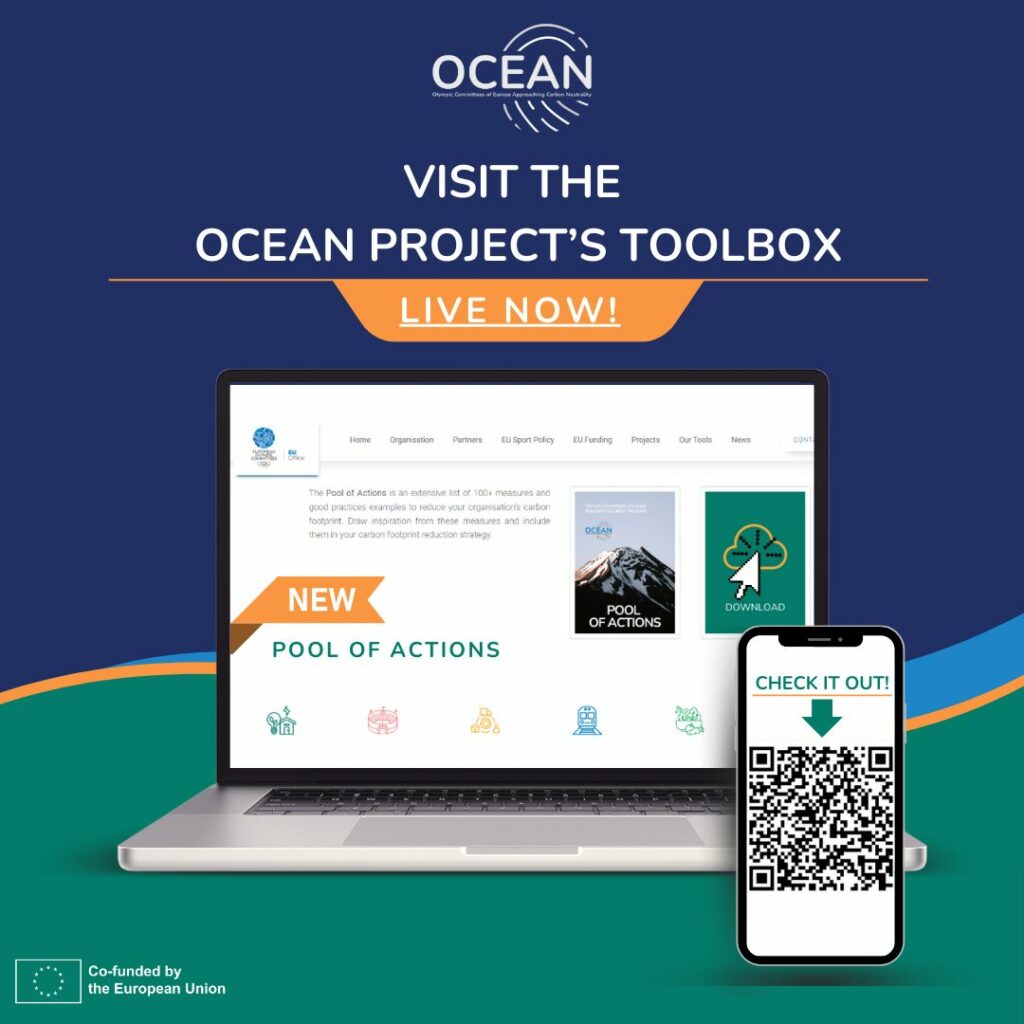
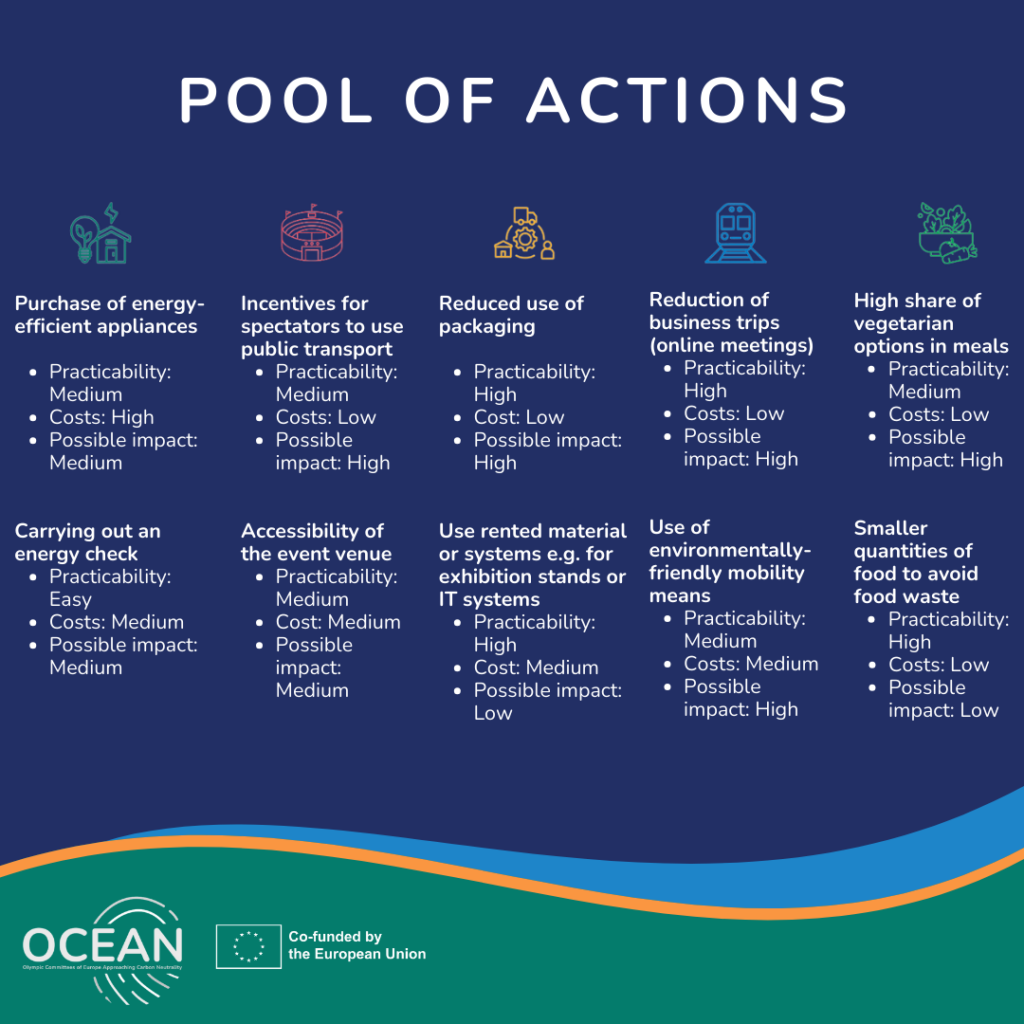
Looking ahead
To empower all sport organisations, the OCEAN Project is also developing Carbon Footprint Measurement Tool which will be soon freely available on the OCEAN Toolbox platform for all 206 NOCs and sport organisations. The tool designed by the Öko-Institut with the 18 NOCs and therefore fits the scope of activities of sport organisations. The tool will be available in English, Spanish, and French.
From April 2025, the carbon Footprint Reduction strategies from the 18 NOCs will be available at the OCEAN Toolbox platform to inspire and encourage NOCs and sport organisations to take on climate action.
The EOC EU Office, coordinator of the OCEAN Project, proudly announces a significant milestone: the 18 National Olympic Committees (NOCs) involved in the project have measured their carbon footprint for the baseline year 2022 and committed to reducing their impact on climate change. Supported by the Öko-Institut, this marks the first step in a collective effort to tackle the challenges of climate change within sports.
The comparative analysis of the NOCs’ footprint, available here, highlights the primary sources of emission for the 18 NOCs, from transport, event organisation or energy consumption to procurement or commuting.
This process is more than a measurement, it is a commitment to action. Each NOC is now working toward adopting a carbon footprint reduction strategy by April 2025, aligned with the UN Sports for Climate Action Framework (S4CA), supported by the International Olympic Committee. The process has included specialised training for the ‘Climate Action Officers’ of each NOC on climate change; measures to reduce the impact of transport or procurement; or communication about sustainability.
As the OCEAN project enters its final phase, project partners want to ensure that the knowledge extends beyond NOCs and organise regular workshops and presentations in local sport organisations, but also schools and communities across Europe. To empower all sport organisations, the OCEAN Project is developing free tools and resources designed with and tested by the 18 NOCs. These include:
These resources will be freely available through the OCEAN Toolbox platform, making it easier for sport organisations to measure, reduce, and act on their carbon footprints.
The results and upcoming tools were presented during the webinar “Reducing Sport Organisations’ Carbon Footprint: Understanding Our Starting Point and Getting Ready for Climate Action” on 26 November. The OCEAN Project invites all sport organisations to join the movement, access the resources, and become agents of change.
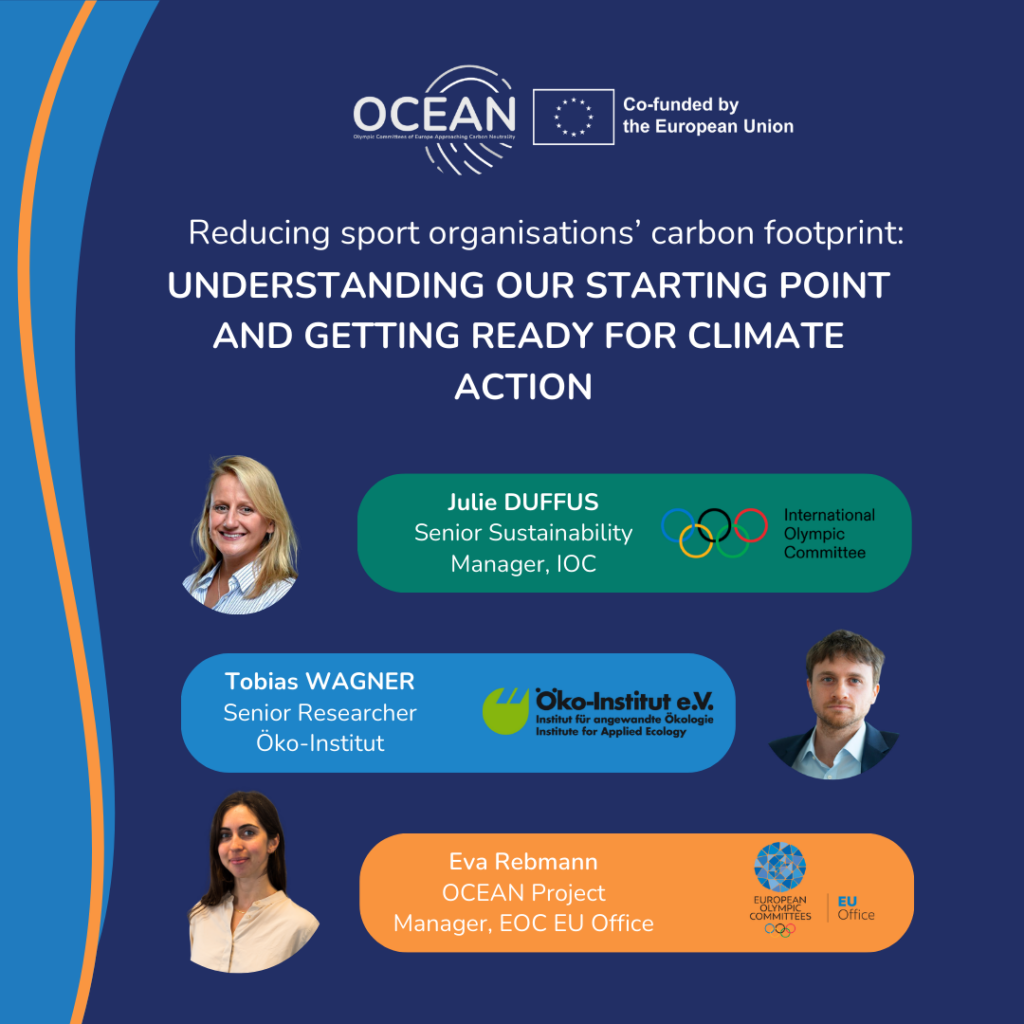
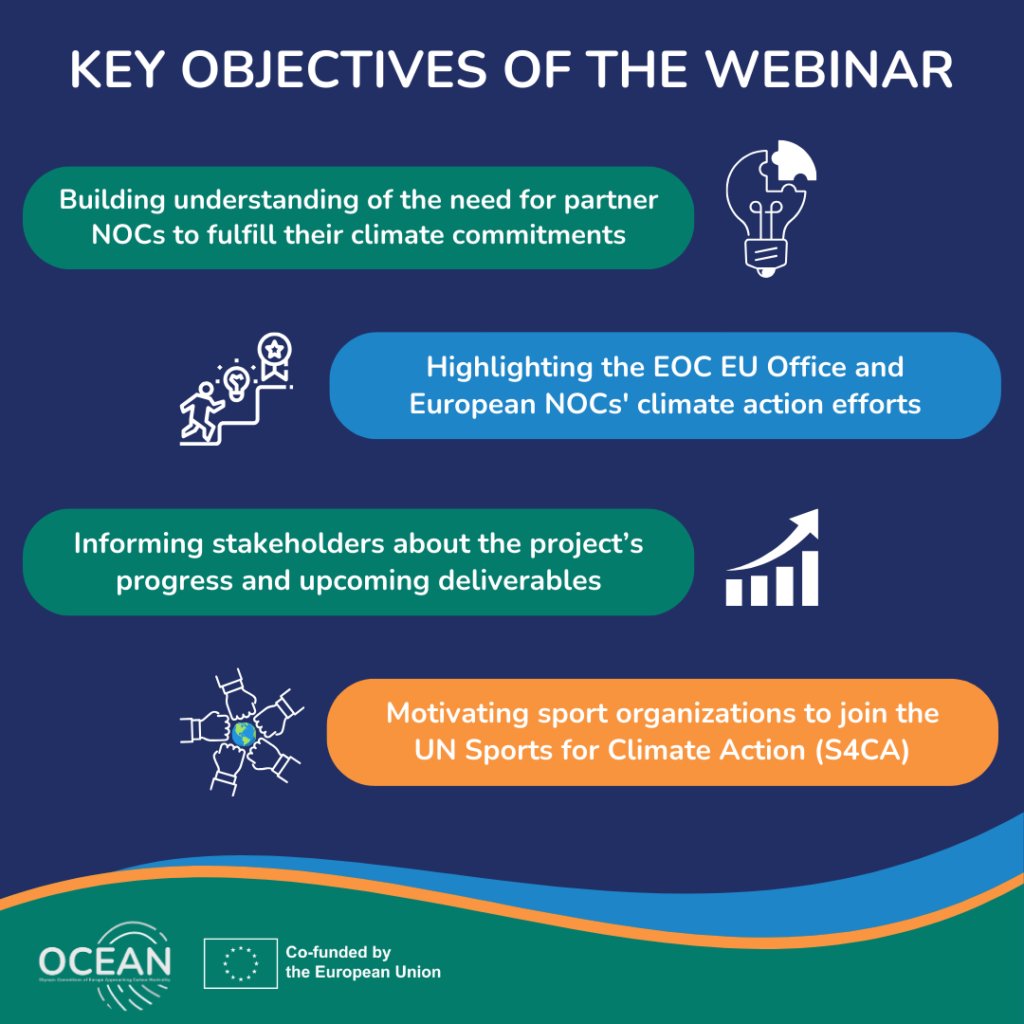
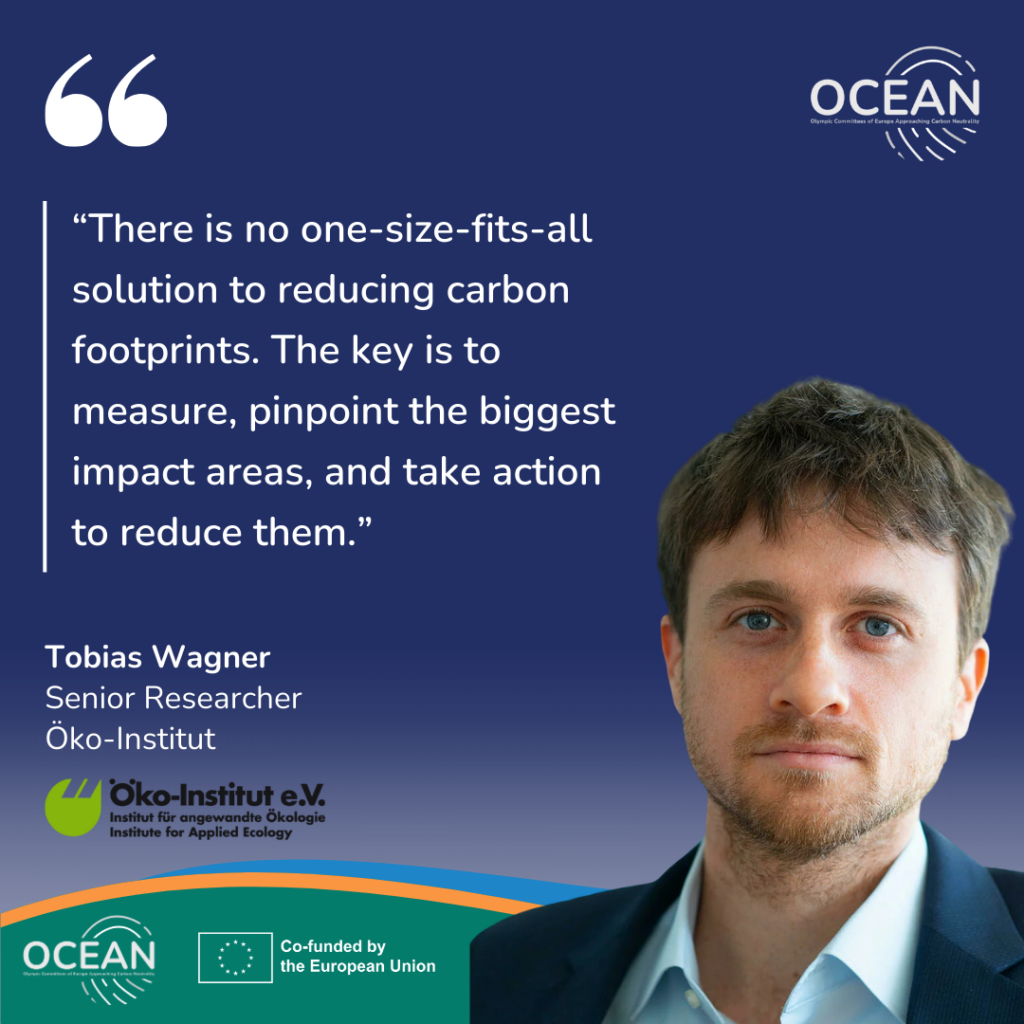
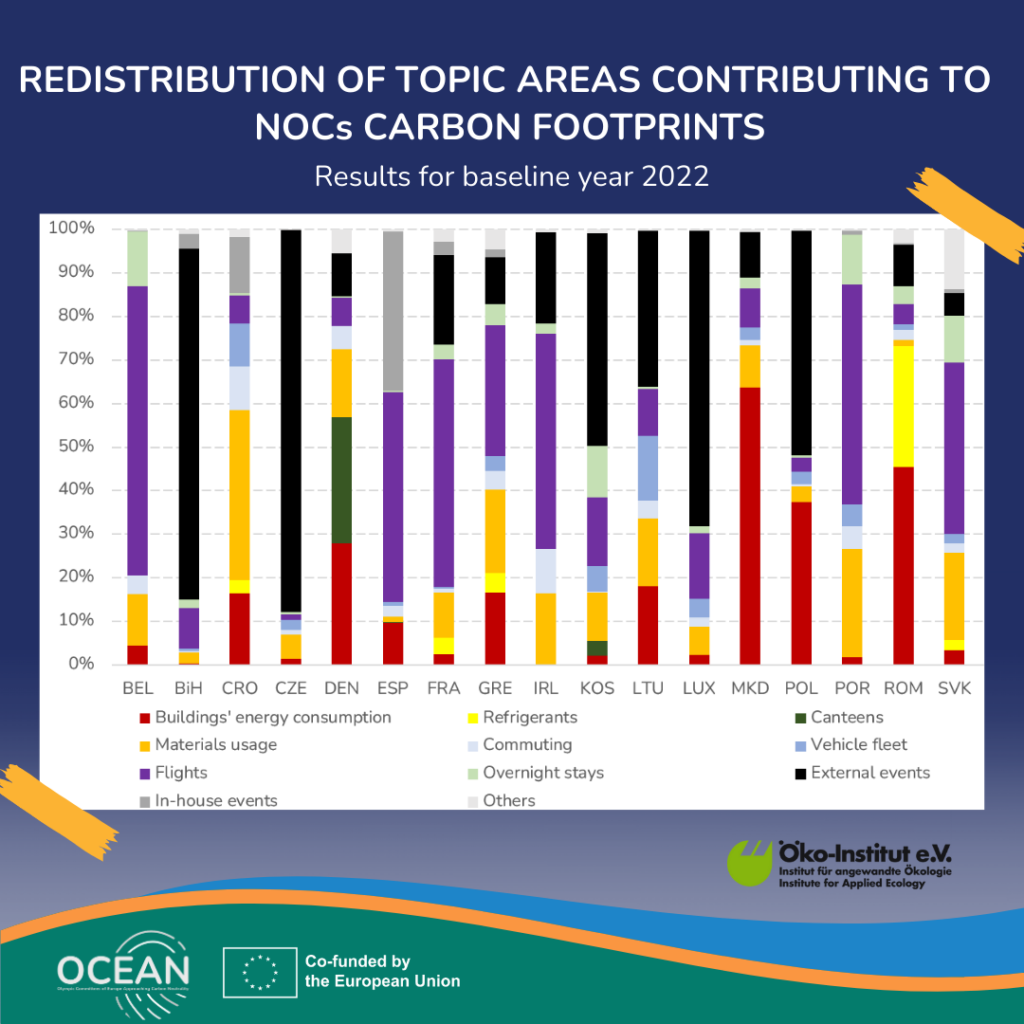
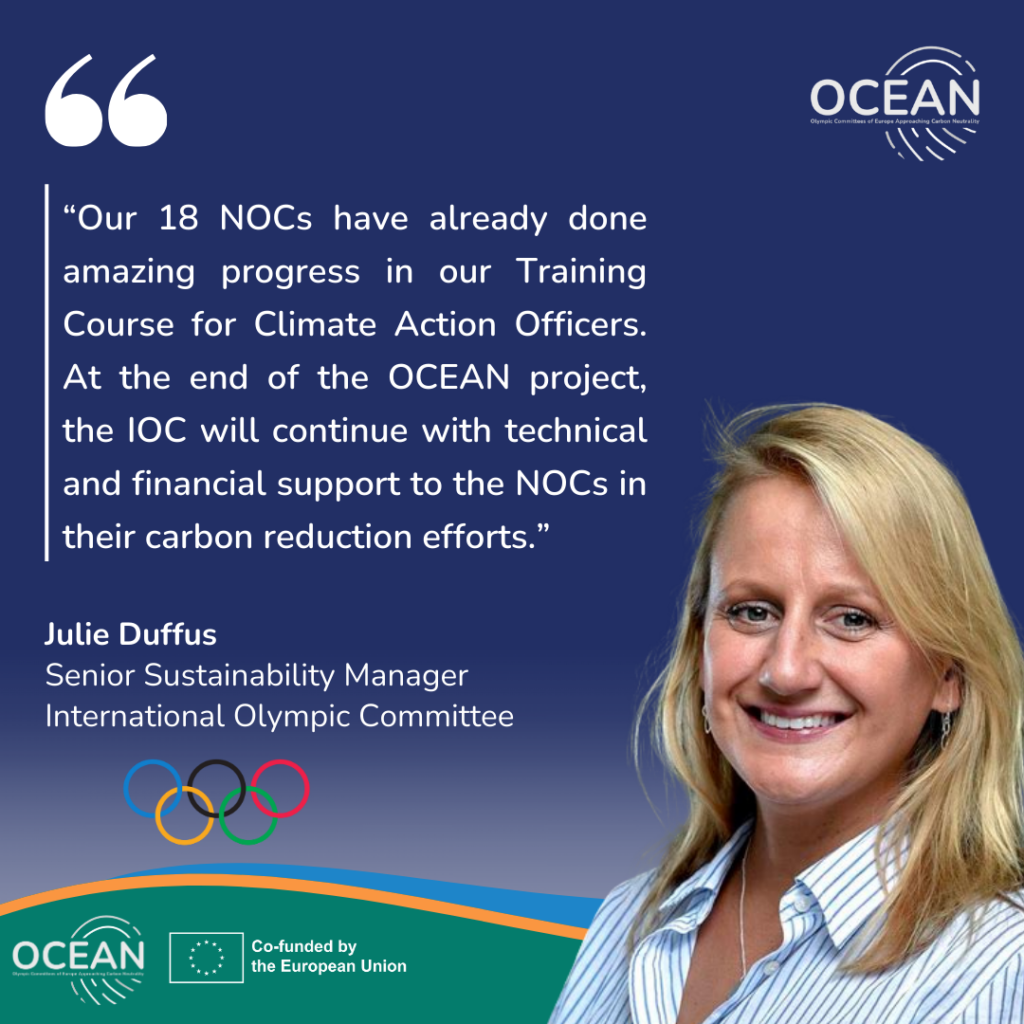
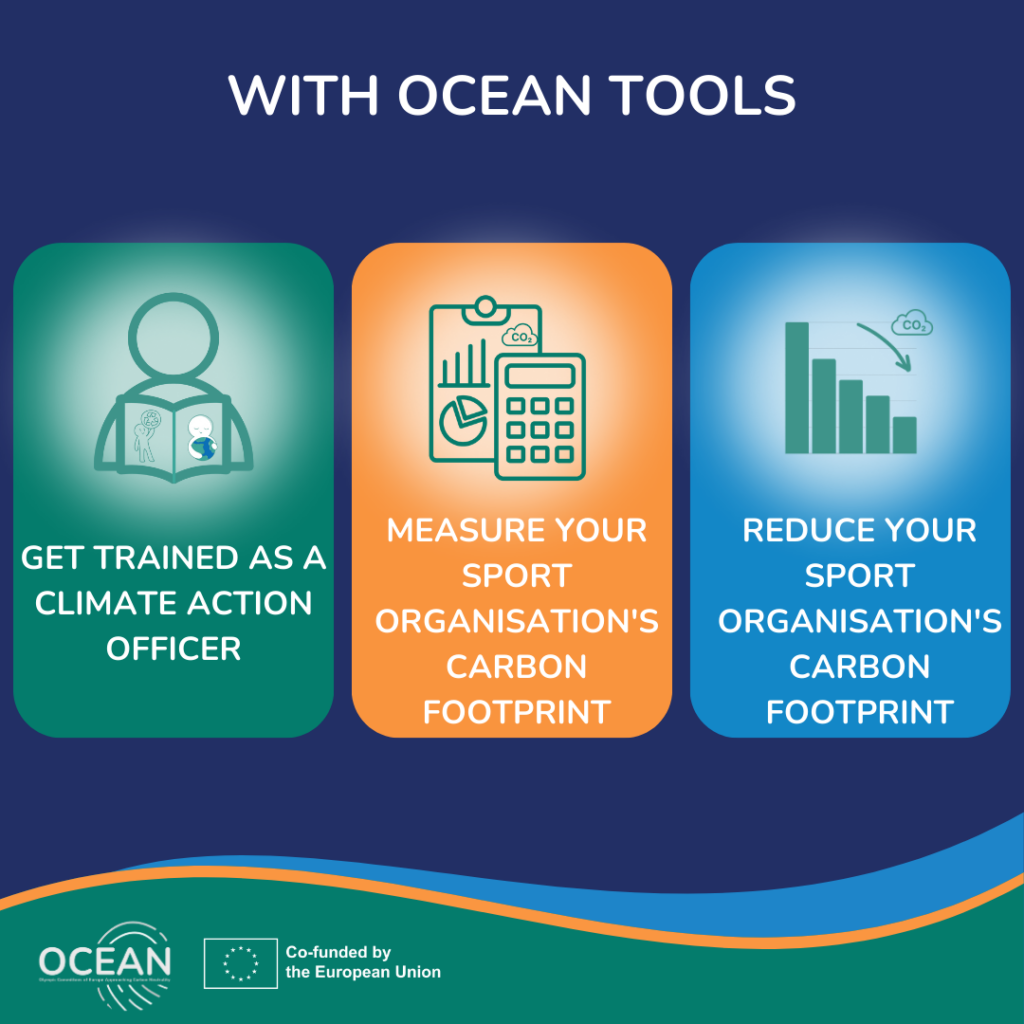
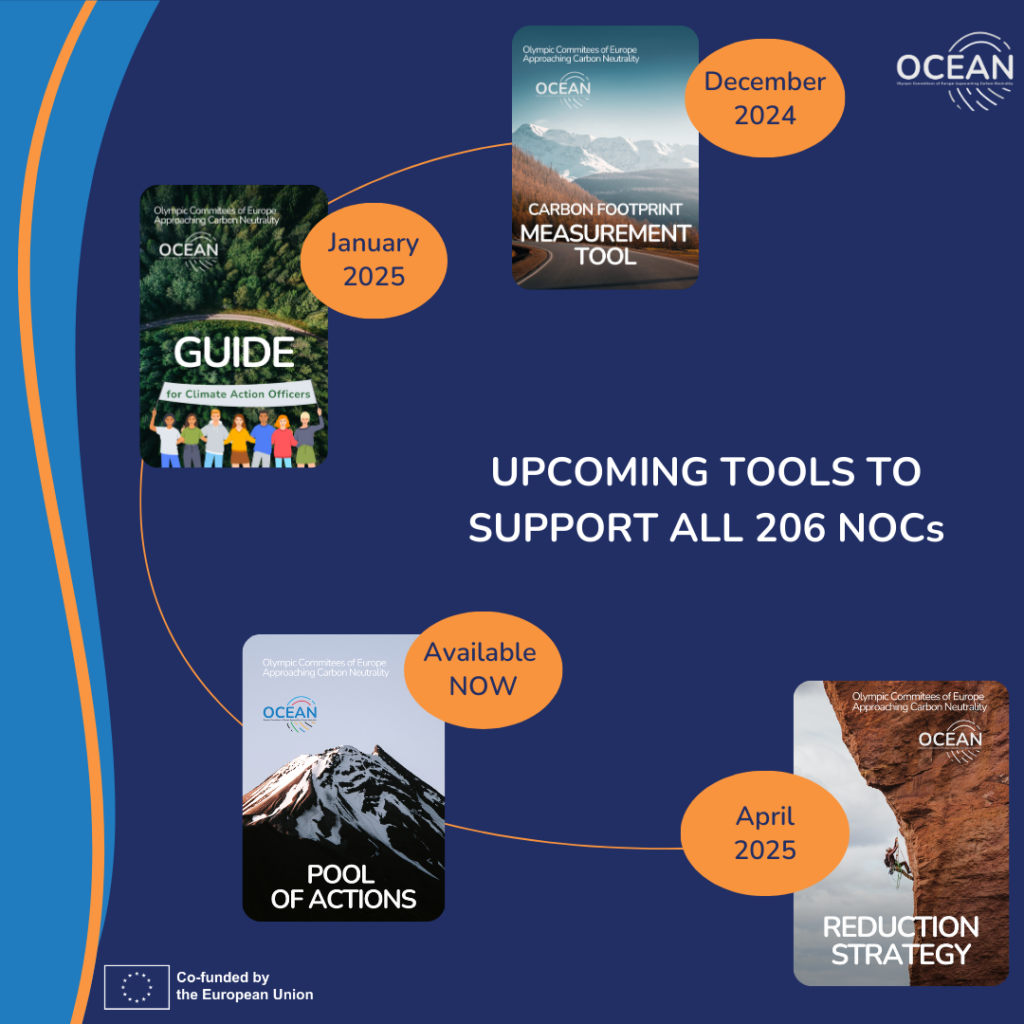
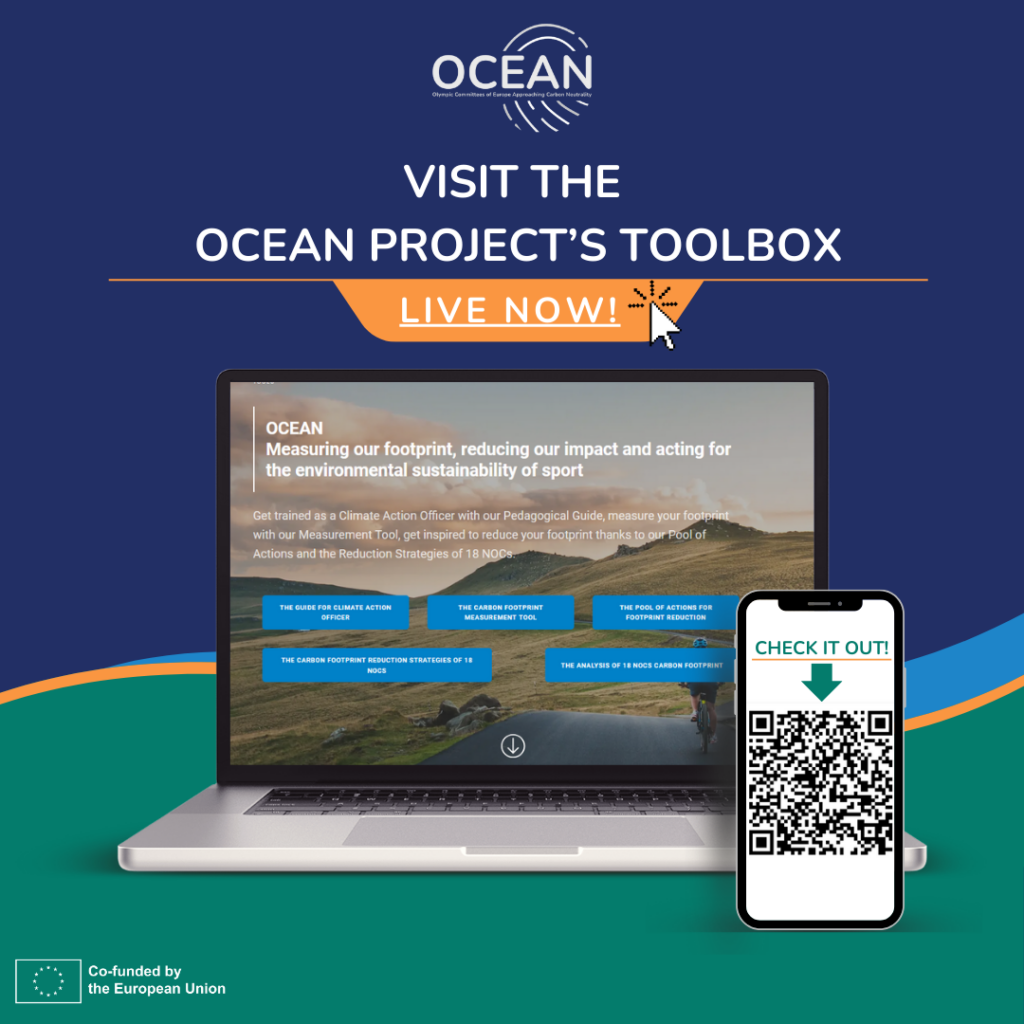
On 17 September, the OCEAN Consortium gathered for the second Peer-to-Peer roundtable on their carbon footprint reduction strategies, followed by Module 4 of the Training Course, with sessions taking place on 19, 23 and 24 September.
On 17 September, the OCEAN Consortium convened online for the second Peer-to-Peer roundtable. Once again, the session proved to provide a valuable platform for Climate Action Officers to exchange ideas and gather peer feedback. It commenced with an overview of NOCs’ state progress in drafting their carbon footprint reduction strategies, followed by the presentation from 6 Climate Action Officers (from NOC Czech Republic, France, Luxembourg, Bosnia and Herzegovina, Belgium and Romania). The roundtable highlighted common challenges faced by NOCs, primarily related to transport, events, procurement and the energy consumption of their facilities. Another widely shared concern was the challenge of persuading leadership and colleagues of the importance of sustainable actions and motivating them to implement behavioural changes to effectively reduce their carbon footprint.
Module 4 of the Training Course, delivered in a three-session format, addressed two of the most critical challenges identified by Climate Action Officers during the Peer-to-Peer Roundtable, focusing on sustainable transport and procurement policies.
The first two sessions, held on 19 and 23 September, delved into sustainable transport policy. These sessions featured presentations on key initiatives undertaken by the International Olympic Committee (IOC) and NOC Denmark aimed at implementing efficient travel policies, followed by an inspiring presentation from the International Biathlon Union (IBU) on their transport policy implementation. These insights helped Climate Action Officers gain a clear understanding of the essential steps required to establish a transport policy, including the identification of key stakeholders and the formulation of guiding principles. Through individual and group reflection, they also identified practical measures to reduce transport-related emissions without disrupting the operations of their NOC. Alongside discussions on travel policies, participants were introduced to Sustainable Aviation Fuels (SAF), with an in-depth analysis of the significant challenges that must be addressed for SAF to become a viable sustainable alternative in aviation. The complexity of transitioning to SAF underlined the importance of even the smallest actions taken in the present moment in contributing to the reduction of the carbon footprint.
On 24 September, the focus shifted towards sustainable procurement policy. An insightful presentation by Ben Barrett, sustainability consultant, revealed positive social, ethical and economic outcomes of sustainable procurement sourcing. Through workshops, Climate Action Officers were provided with the tools and frameworks necessary to design an effective procurement strategy, with an emphasis on establishing guiding principles aligned with their sustainability goals.
NOCs are now expected to continue developing their carbon reduction strategies, with adoption scheduled for Spring 2025. The Consortium’s collaborative efforts will resume in November with the next Peer-to-Peer Roundtable, concluding 2024 with the second Project Meeting and Module 5 of the Training Course in Prague.

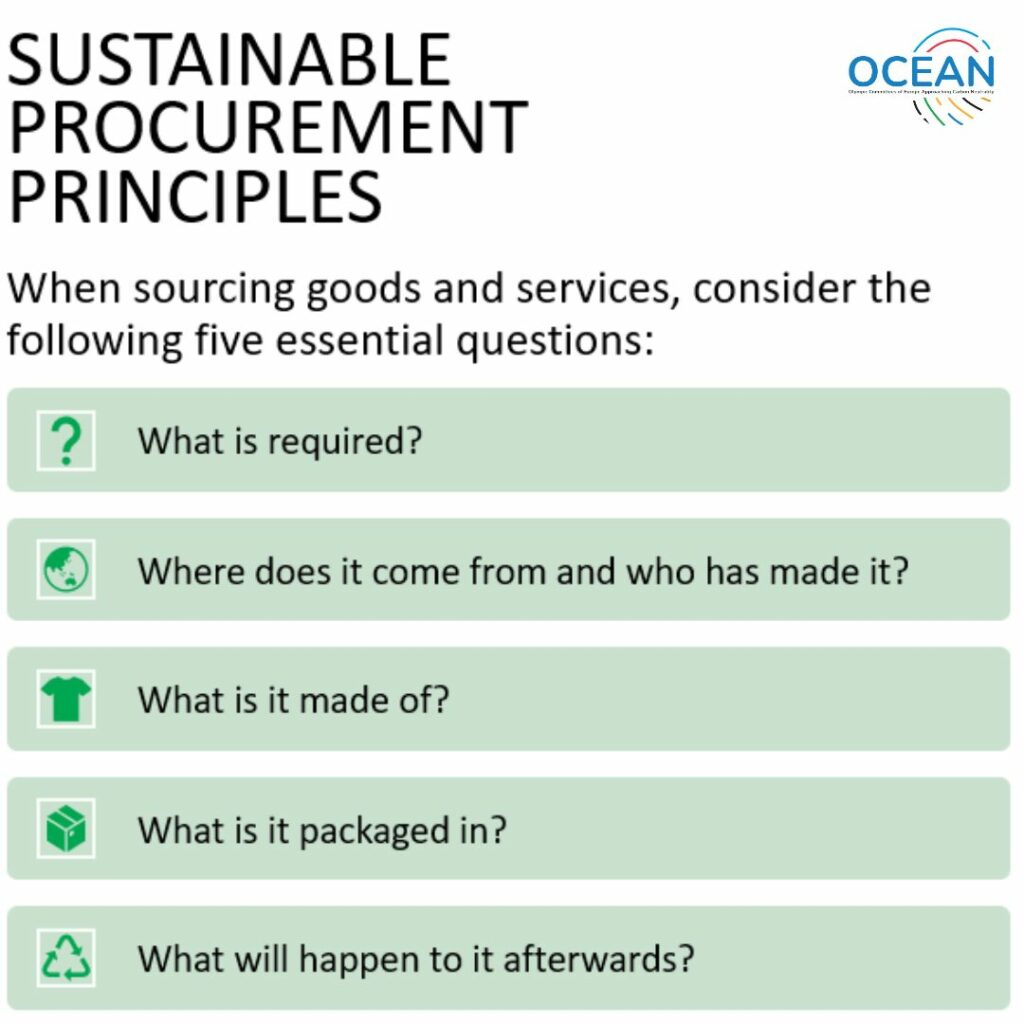
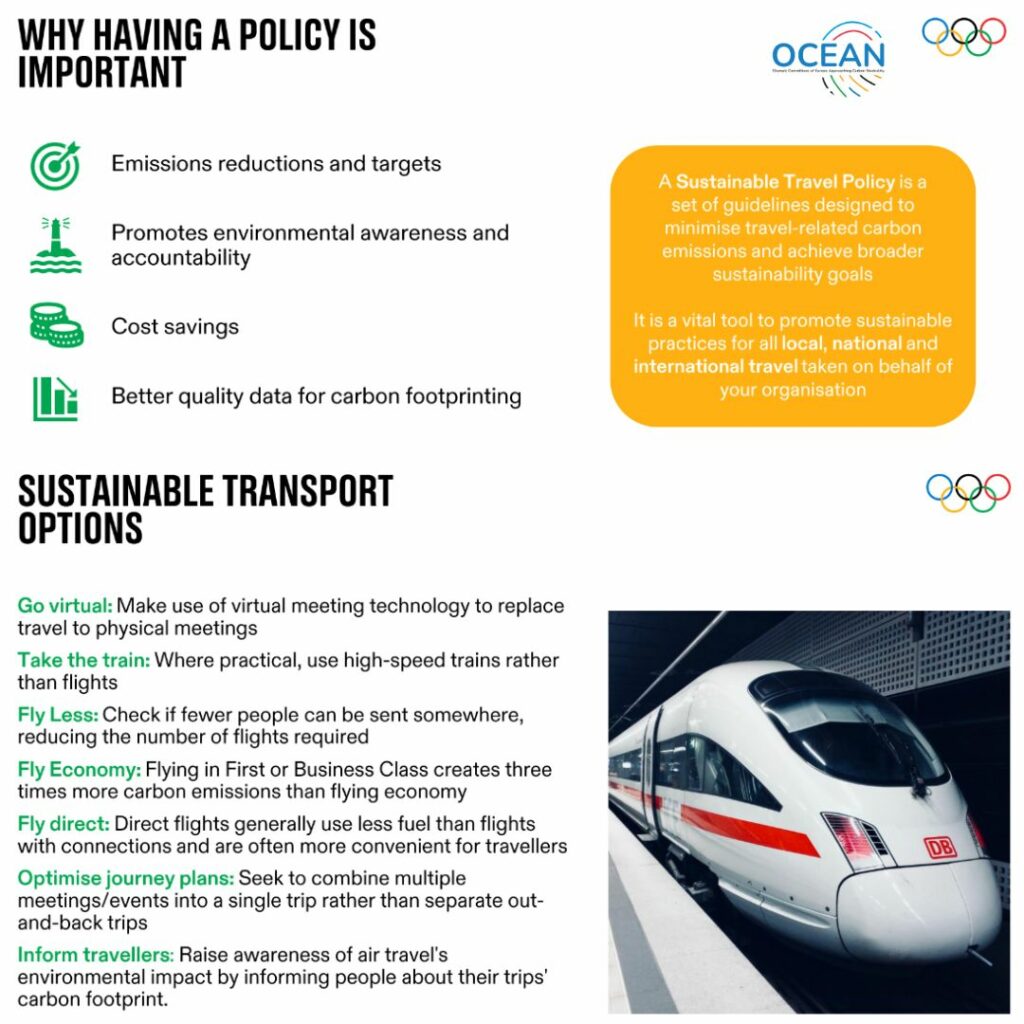
The 4th Consortium Call took place on 2nd July. The EOC EU Office organised this online conference to set up a feedback session on the various actions that have been implemented since the third Consortium Call in January and to give a summary of the tasks that would be coming up.
The 18 NOCs received feedback from the Öko-Institut on the carbon footprint results and the upcoming tool. The OCEAN management team presented its approach to help Climate Action Officers obtain support from their leadership and NOC president in implementing their carbon footprint reduction strategy.
The Consortium will meet again after the Games with many meetings planned before the end of 2024. The second peer to peer roundtable on reduction strategies will be held online on 17September, followed by the Module 4 of the Training Course and the EOC Seminar. The consortium will meet again in Prague for the second Project Meeting and Module 5 of the Training Course in December. A webinar for NOCs Presidents, a workshop on the Pool of Actions and bilateral calls will also be organised before the end of 2024.
In the meantime, Climate Action Officers have been asked to continue drafting their carbon footprint reduction strategies, the adoption of which is scheduled for Spring 2025.
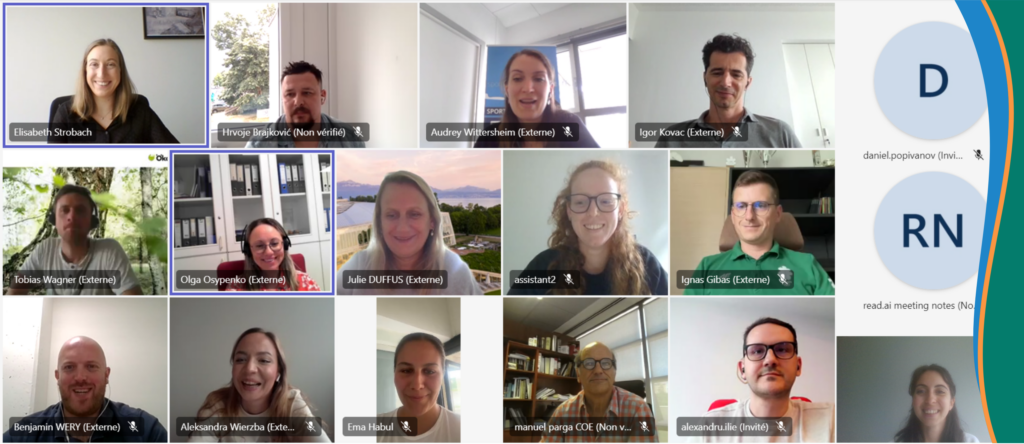
On 18 June, the OCEAN Project Consortium gathered online for the first peer-to-peer roundtable.
Climate Action Officers presented the state of their carbon footprint reduction strategy. This collaborative opportunity aimed to draw inspiration from others and get feedback from peers to move forward in this process. This session highlighted the common challenges faced by the NOCs and raised awareness of the range of measures that can be implemented at national level.
Congratulations to the 18 NOCs for their progress and commitment to reducing sport's carbon footprint. A second roundtable will be held in September.

On 13 May, the 4th seminar on carbon footprint measurement was held online by the Öko-Institut to discuss advancements and challenges in measuring the carbon emissions of NOCs. In addition to discussions on the scope and results of footprint measurement, valuable inputs on carbon compensation and offsetting were presented, helping NOCs work on their reduction strategies.
Tobias Wagner from the Öko-Institut kicked off the seminar with an overview of the project's phases over the past months. Two months after the meeting in Lausanne, Climate Action Officers have had the opportunity to raise any remaining questions on the scope and results of their carbon footprint measurement. Tobias Wagner presented updates to the Excel tool, which has been improved to fit better with users’ feedback. The updated tool will be available for NOCs in the Autumn, while the online tool will be ready by the end of the year.
As the NOCs started to draft their carbon reduction strategies, the inputs on carbon compensation and offsetting presented by Martin Cames from the Öko-Institut have been valuable information to help the Climate Action Officer in this process. He discussed the broader context of climate responsibility versus climate compensation and highlighted the challenges involved in purchasing offset credits and the risk of greenwashing. In fact, he warned the Climate Action Officers about the reliability of re-forestation projects in terms of offsetting and advised that these kinds of projects should be approached with caution when used as offsetting mechanisms.
The NOCs are now expected to develop their reduction strategies, the adoption of which is scheduled for Spring 2025. Seminar 5 will be held online in Autumn 2024, followed by Module 5 and a project meeting in Prague in December.
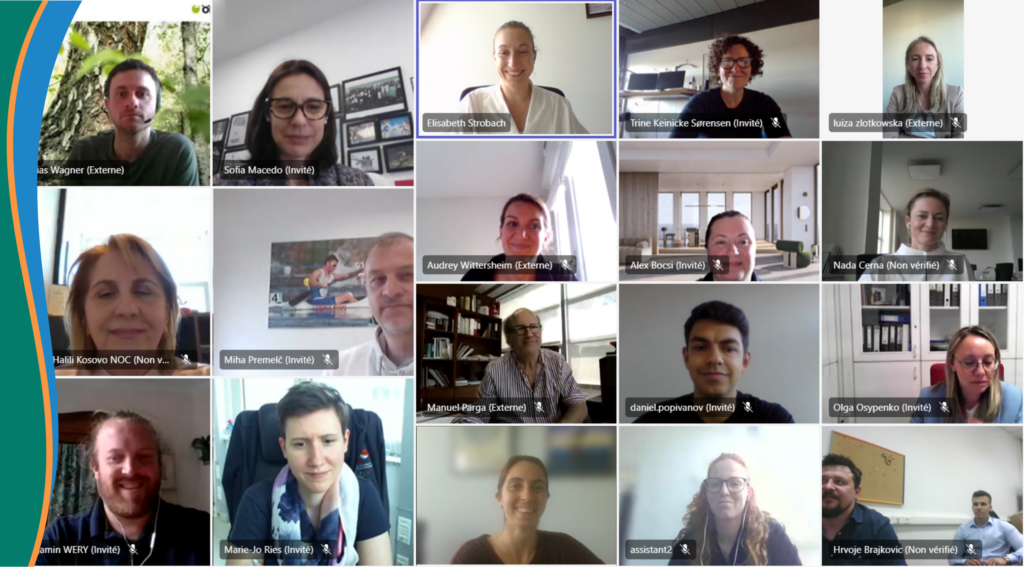
The 18 Climate Action Officers engaged in the OCEAN Project started to develop their NOC’s carbon footprint reduction strategy, during a 3-day meeting in Lausanne.
From 18 to 21 March, the Climate Action Officers from the 18 partner National Olympic Committees (NOC) met in Lausanne to assess the progress made and acknowledge the first successes, one year after the launch of the OCEAN project (Olympic Committees of Europe Approaching Carbon Neutrality).
The 18 Climate Action Officers discovered their organisation's carbon footprint after working together with the Öko-Institut on the measurement over the last twelve months. It allowed them to understand their main sources of emissions and to engage in several discussion rounds with the Öko-Institut and Julie Duffus, from the IOC, on how NOCs can move forward in their transition and join the UN Sports for Climate Action Framework. After learning about the main steps of the carbon reduction process, the NOCs’ Climate Action Officers reflected on potential objectives to set and measures to take.
Jon Wyatt’s shared experience as Sports Director at the International Hockey Federation (FIH), managing his organisation's sustainability department gave the OCEAN Consortium valuable information to consider on how to manage the process of implementing a carbon reduction strategy. On this basis, Climate Action Officers were fully equipped to start drafting their carbon footprint reduction strategy.
The results of the NOCs’ carbon footprint measurement will be shared publicly in the course of this Spring, following which the Online Tool for carbon footprint measurement will be revealed to the public at the end of the year. In the meantime, Climate Action Officers are to finalise their NOC’s carbon footprint reduction strategy. The OCEAN Project will conclude in April 2025.
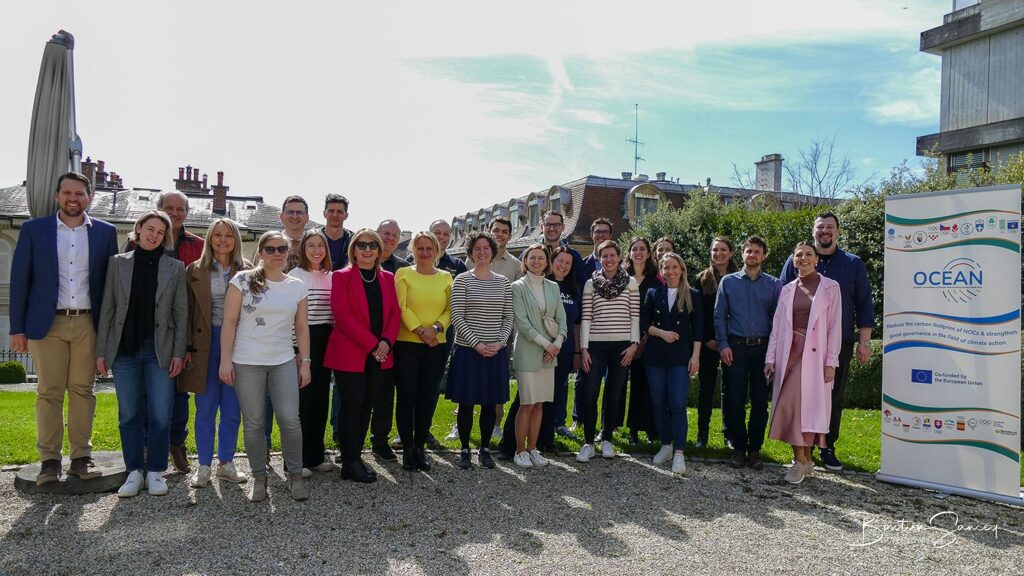
The third Consortium Call took place on January 23. The EOC EU Office organised this online conference to set up a feedback session on the various actions that have been implemented since the second Consortium Call in November and to give a summary of the tasks that would be coming up.
The Öko-Institut has presented the progress made in collecting data from each NOC. It should be submitted, reviewed and finalised before the next step of the OCEAN project, scheduled in Lausanne at the ANOC and IOC Headquarters from 18 to 21 March. Module 3 of the Training Course aims to enable NOCs to understand their carbon footprint, using the data analysis provided by the Öko-Institut and thereby start to elaborate a carbon reduction strategy.
In the meantime, Climate Action Officers will be asked to share some examples of good practices that they may have already implemented within their organisation.
